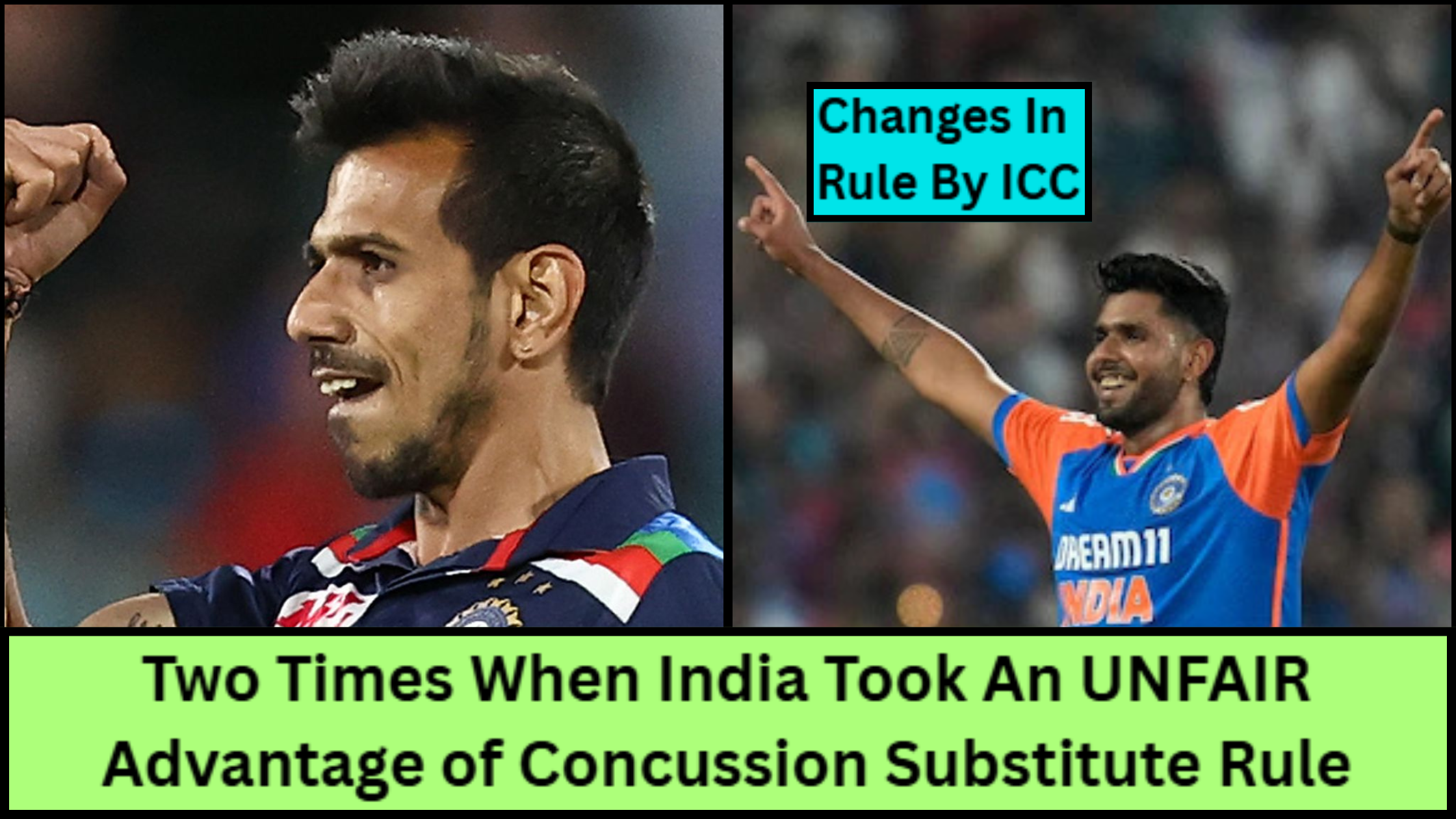Cricket as a sport can be risky sometimes, especially with the increasing pace and power in the modern game. The introduction of the concussion substitute rule highlights how seriously head injuries are now taken in the sport. Fast bowlers regularly deliver balls over 140 km/h, and a misjudged bouncer can strike the head or helmet. Close-in fielders (like short leg or silly point) are at high risk from deflections or aggressive shots. Wicketkeepers and slip fielders face risk from sharp edges or unexpected bounce.
The tragic death of Phillip Hughes in 2014 was a turning point, leading to stricter protocols and the introduction of a like-for-like concussion replacement rule by the ICC (International Cricket Council) in 2019. Since the concussion substitute rule came into existence, quite a few players have been replaced during the match after an individual (a player who will be replaced) got hit on the head. But there are two instances where the Indian Cricket Team has taken an unfair advantage of the concussion substitute rule. Today, we will talk about those moments in detail. So, without wasting any time, let’s start.
Concussion Substitute Rule Explained
Before going ahead, let’s first learn what the concussion substitute rule is. The ICC introduced this rule in 2019 for the safety and protection of the players. According to this rule, if a player gets hit on the head on the field (in whatever way, like while batting, bowling, or fielding), another player from the same team’s squad can replace him in that particular game. The affected player will then be unable to return and play, but a substitute player can perform tasks such as batting, bowling, or fielding.
Another condition in this rule is that only a like-for-like replacement can be made. For example, if a fast bowler gets hit on the head, another fast bowler from the same team will replace him. The same is the case with the batter. If the ball hits the head of a player who is a batter, another batter will replace him in that game. This rule applies to the spinners, all-rounders, and whatever role an injured player possesses. But there are two instances where the Indian Cricket Team took an unfair advantage of the concussion substitute rule. Let us now see those moments one by one.
Two Moments Where the Indian Cricket Team Took An Unfair Advantage of the Concussion Substitute Rule
-
Yuzvendra Chahal Replacing Ravindra Jadeja in a T20I Game Against Australia (December 2020)
The first of the two instances happened in a T20I game between India (IND) and Australia (AUS). It was the first T20I of the series, played at Manuka Oval, Canberra on December 04, 2020. India batted first and were struggling at one stage with 92-5 in 13.5 overs. Ravindra Jadeja joined Hardik Pandya at the crease, and the pair added 22 runs for the 6th wicket. Jadeja, along with Washington Sundar, added 38 runs for the 7th wicket.
During the inning, Ravindra Jadeja got hit on the helmet. He was also struggling with his hamstring. But, he went on to bat throughout the inning and scored an unbeaten 44 runs off just 23 balls. He scored 5 fours and a six in his innings. With those two small partnerships with Pandya and Sundar, he helped India recover from the pressure situation. Team India went on to score 161 runs on the board in the first inning.
David Boon, the match referee in that game, allowed Team India to replace Ravindra Jadeja with Yuzvendra Chahal as per the concussion substitute rule. But was that a like-for-like replacement? Clearly not. Jadeja is an all-rounder who is a finger spinner. Yuzvendra Chahal, on the other hand, is a wrist-spinning bowling option. The Indian team’s argument would be the availability of a player in the squad. In the Indian team’s squad, the other options are Jasprit Bumrah, Shreyas Iyer, Navdeep Saini, and Mayank Agarwal. Obviously, all four players were not even close to the like-for-like replacement of Jadeja.
ALSO READ: Jasprit Bumrah Opened up on Not Becoming India’s Test Captain
Chahal Won The Game for India and Became The Man of the Match
Yuzvendra Chahal won the game for India with his 3/25-run spell in his 4 overs. The Australians were going well in a run chase, but Yuzvendra Chahal bowled a match-winning spell for India. In the game, India takes the batting of Jadeja and takes the bowling of Chahal, who is more of a wicket-taking option as compared to Jadeja. The Australian team clearly was not happy with the match referee allowing Team India to play Chahal in place of Jadeja. Also, Australia’s then head coach Justin Langer unhappily spoke to David Boon about the scenario.
Chahal was not a like-for-like replacement of Jadeja, but this is how it is. The situation demanded, and Chahal became the Man of the Match (MOTM) in that game.
-
Harshit Rana Replacing Shivam Dube in a T20I Game Against England (January 2025)
The incident happened during the India vs England T20I game, played at the Maharashtra Cricket Association Stadium, Pune on January 31, 2025. India batted first and were struggling at one stage with 79/5 in 10.4 overs. Shivam Dube and Hardik Pandya, the two all-rounders, steadied the ship for India and added 87 runs for the 6th wicket. During the inning, Shivam Dube got hit on the helmet by a short ball from Jamie Overton. He went on to bat and scored 53 runs off 34 balls with 7 fours and 2 sixes.
India, with the help of the Dube-Pandya partnership, has managed to score 181 in the first inning. When England came out to bat, Shivam Dube did not take the field. Harshit Rana replaced him in the second inning as per the concussion substitute rule. Javagal Srinath, the match referee in that game, allowed Team India to replace Harshit Rana with Shivam Dube. But was that a like-for-like replacement? Again, clearly not. And this time, Team India has Ramandeep Singh in the squad, who was a like-for-like replacement of Shivam Dube. Both Ramandeep and Dube are batting all-rounders, and Rana is a pure fast bowler (with some batting skills).
Harshit Rana Bowled a Game Changing Spell in that Game
In that game, Team India took the batting of Shivam Dube and the bowling of Harshit Rana, who is more effective as a bowler as compared to Dube. Rana took the wickets of two dangerous batters, Liam Livingstone and Jacob Bethell. He also took the wicket of Jamie Overton (when England needed 19 runs off 7 balls), who batted well in that game. Rana’s spell of 3/33 in 4 overs helped India to win that game by 15 runs.
The match referee should have looked into it a bit more, as someone like Ramandeep Singh could have been a like-for-like replacement in that game. England was not happy with the situation. In the next game (5th T20I), Jos Buttler (then England’s T20I captain) took a dig at the situation and announced four impact substitutes in the game. The impact player rule is applicable in IPL, where a player can replace another player of any role at any time.
ALSO READ: All French Open Events Winners
CONCLUSION: The ICC Has Changed The Concussion Substitute Rule
Now, the concussion substitute rule is still in play, but there are some changes that the ICC (International Cricket Council) has made. The teams will now have to inform in advance that, apart from the playing XI, who are those players that will be on the bench, with their roles. For example, if Team India is playing and a bowling all-rounder gets hit on the helmet, only the other bowling all-rounder in the squad can replace the injured player for that game. The rule is applicable for all the roles like batter for batter, bowler for bowler, pacer for pacer, spinner for spinner, and so on. Also, if possible, only the right-handed batter will replace the right-handed batter, the left-arm pacer will only replace the left-arm pacer, and so on, during the game, depending on the player’s availability in the team’s squad.
What do you think? Was that a good decision by the match referees in both of the above-mentioned scenarios? Comment on your opinion below. Thank you for reading. Keep following us for the latest updates, news, stories, analysis, predictions, records, stats, insights, and more.











Nice Article